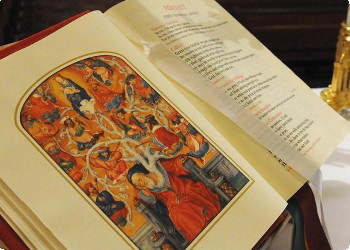When you are invited, go and take the lowest place
3 NOVEMBER (Lk 14,1.7-11)
Inviting someone in your home is a sign, in Scripture, of most great honour. The invitee is asked to be a part of their lives. What is the honour greater than this!
Then the king said to her, “What is it, Queen Esther? What is your request? Even if it is half of my kingdom, it shall be granted you.” “If it please your majesty,” Esther replied, “come today with Haman to a banquet I have prepared.” And the king ordered, “Have Haman make haste to fulfill the wish of Esther.” So the king went with Haman to the banquet Esther had prepared. During the drinking of the wine, the king said to Esther, “Whatever you ask for shall be granted, and whatever request you make shall be honored, even if it is for half my kingdom.” Esther replied: “This is my petition and request: if I have found favor with the king and if it pleases your majesty to grant my petition and honor my request, come with Haman tomorrow to a banquet which I shall prepare for you; and then I will do as you ask.” That day Haman left happy and in good spirits. But when he saw that Mordecai at the royal gate did not rise, and showed no fear of him, he was filled with anger toward him. Haman restrained himself, however, and went home, where he summoned his friends and his wife Zeresh. He recounted the greatness of his riches, the large number of his sons, and just how the king had promoted him and placed him above the officials and royal servants. “Moreover,” Haman added, “Queen Esther invited no one but me to the banquet with the king; again tomorrow I am to be her guest, with the king. Yet none of this satisfies me as long as I continue to see the Jew Mordecai sitting at the royal gate.” His wife Zeresh and all his friends said to him, “Have a gibbet set up, fifty cubits in height, and in the morning ask the king to have Mordecai hanged on it. Then go to the banquet with the king in good cheer.” This suggestion pleased Haman, and he had the gibbet erected.(Est 5,3-14).
Jesus was also invited by both by common, poor, humble people, and by wealthy, rich, or socially and religiously important people. Every invitation was for Jesus an actual test. He was scrutinized in everything he did or did not do. They wondered about him why he did and also did not do one thing. But he lived all according to the will of the Father, in the highest prudence and wisdom.
Jesus also noted everything. Nothing escaped his eye constantly guided by the Holy Spirit. But his was a vision of love, salvation, redemption, full truth, and perfect justice. A sound teaching always began from his observation. Life, history, the daily behavior of men for Jesus was a real chair, a true free text from which to start in order to teach the will of his Father. He did not start with abstract theories. He saw man outside the will of God and invited him to live according to the highest truth, knowledge, wisdom, and intelligence.
On a Sabbath he went to dine at the home of one of the leading Pharisees, and the people there were observing him carefully. He told a parable to those who had been invited, noticing how they were choosing the places of honor at the table. “When you are invited by someone to a wedding banquet, do not recline at table in the place of honor. A more distinguished guest than you may have been invited by him, and the host who invited both of you may approach you and say, ‘Give your place to this man,’ and then you would proceed with embarrassment to take the lowest place. Rather, when you are invited, go and take the lowest place so that when the host comes to you he may say, ‘My friend, move up to a higher position.’ Then you will enjoy the esteem of your companions at the table. For everyone who exalts himself will be humbled, but the one who humbles himself will be exalted.”
What a difference with our daily way of acting, observing, seeing, see. We hardly ever start from the will of God. We do not know it. We do not even know what the will of God is. We do everything starting from our whims, vices, sins, hypocrisy, arrogance, overbearingness, ignorance, stupidity, vanity, pride, desire for worldly and ephemeral glory. We make great homilies to the walls of our churches – even if they get tired of hearing us: so vain and empty is our teaching – and then we leave every one of our brothers in his error, falsehood, lie, deception, misunderstanding of life and wrong relationship with history.
It cannot be otherwise. If we do not have the will of God, how can we think of giving it to our brothers? If we are hypocrites and boastful, how can we hope to teach humility to those who walk with us? Never might a vain, a superb, a vainglorious person claim to be a good teacher to others.
Virgin Mary, Mother of the Redemption, Angels and Saints teach us true humility.





